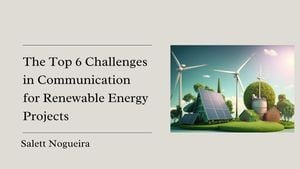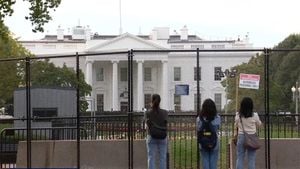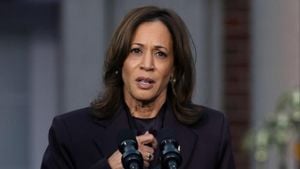The political scene in the United States is once again buzzing with fervor after Donald Trump's surprising victory in the 2024 presidential election. This development has sent shockwaves through the country, raising questions about democracy, party dynamics, and how this election will shape the future for both the Republican and Democratic parties.
While Trump's supporters celebrate, opponents are left grappling with the ramifications of his re-election. Many Democrats are reeling from the ramifications of Vice President Kamala Harris' unexpected defeat, which has stirred discontent within the party. This internal strife raises concerns about the party's ability to unite and regroup for forthcoming elections. Biden’s administration seemed confident, but now faces scrutiny and dissent as they prepare for their next move.
According to reports, Trump’s return to power was not just about his core base; he also managed to capture the popular vote, something he hadn’t done during his first term. Analysts suggest this could be interpreted as not merely endorsement but rather the electorate’s message demanding change. For many voters frustrated with the status quo, Trump appeared to be the change they were seeking.
Trump's campaign rhetoric centered around themes of retribution and the fight against what he brands as 'the enemy within,' which has raised alarms among civil rights and justice advocates. Chris Hayden, the Executive Director of the ACLU, highlighted these concerns, stating, “There is no doubt Trump's agenda this time around poses resistance to the values of civil liberties and protections we hold dear.”
Adding to the tensions, Trump has promised to continue his rollback of regulations across various sectors, including the environment. During his first time in office, Trump was known for easing restrictions on fossil fuels and climate-related regulations dramatically. This time, political observers are closely monitoring how these promises might shape future government policies, especially with Trump’s Project 2025 on the horizon, aiming to cement new governing norms.
Meanwhile, the economic conditions leading up to the election left many voters feeling anxious, with discussions around inflation and job security dominating kitchen-table conversations. Many exit polls noted voters ranked the economy as their second concern, just behind democracy itself. This suggests a unique moment where Americans are prioritizing the health of their democratic institutions even as they fret about their personal financial situations.
Democracy appeared prominently on ballots, yet those worried about the electoral process's integrity did not align with Biden-Harris’ vision, leading to their losses. This dynamic appears counterintuitive, as one would assume Harris, offering optimism and progressiveness, might have fared much stronger against Trump’s fear-based messaging.
Reports indicated nearly 75% of voters expressed feeling the pinch of inflation significantly affected their families, which undoubtedly affected their voting habits. It stands to reason those who felt their livelihoods threatened turned to familiar faces of resistance to the current administration, culminating in Trump's victory.
Opinions from prominent analysts signify this election result isn’t merely about Trump but reveals the deep-rooted dissatisfaction voters harbor against political parties and their handling of pressing issues. For many, Trump's message has found resonance, signifying palpable dissatisfaction with the alternative offered by the Democrats.
Now, as members of the Biden administration grapple with the shifts, they have emphasized the need to address party unity moving forward. Facing the wrath of disappointed voters, Biden endorsed efforts to rally Democrats around shared goals, emphasizing the importance of overcoming internal dissent. “We must refocus our energy. It’s about uniting our voices to be the change we need,” he stated during his address to the nation.
Many Democratic leaders are calling for introspection over the next few months to regain the faith of their constituents. Strategic advisors suggest establishing clearer dialogues with grassroot movements to address the divisiveness and to champion issues prioritized by the electorate.
Political scientists weigh in on the future of congressional dynamics. Experts suggest it’s too early to predict how Trump's policies will impact Congress. Uncertainty looms over how cooperatively Trump’s administration will work alongside Congress, especially facing scrutiny from various factions within the Republican party.
Democratic leaders remain hopeful yet cautious as they try to foresee the obstacles Trump's administration may introduce. Some speculate Trump's volatile approach to governance could force significant shifts even within his party.
The recent elections are undeniably pivotal for not only the U.S. but for the global perception of American democracy. Evaluation of candidates from different backgrounds, alongside citizens rallying around issues, may benefit or challenge forthcoming elections depending upon how political narratives develop. Germany's recent governmental collapse was even linked to influences from Trump's presidency, showing the broader effects of these political waves.
Many political pundits argue the resilience of American democracy will now be tested more than ever as it navigates through Trump's controversial rhetoric and populist portrayal of ‘the other.’ Observers are keeping their eyes on upcoming elections to analyze the potential backlash stemming from his policies which may inflate partisan divides.
Despite the apparent triumph, signs of political polarization are casting shadows over Trump’s return. Can he maintain such enthusiasm from his base, or will the disenchantment from before shape Republican strategies? With many expecting internal conflict and voter backlash, the political atmosphere is rife with speculation as Biden and his team ramp up efforts to reposition their platforms.
What looms over the United States is undeniably complex. While Trump’s loud triumph signals the re-emergence of entrenched conservatism, Democrats will have much ahead to decipher this changing political climate, where internal divisions pose risks to their unity. The path forward is anything but predictable as both parties find themselves at crossroads, challenges brewing on the horizon.
Analysts suggest the polarized atmosphere reveals the fragility underlying U.S. democracy; health of both parties will be gauged whether they can embrace adaptability to endure perpetual change. Indeed, the forces behind and against Trump's administration are deeply interwoven with national identity, politics, and the very fabric of governance.
The stakes for moving forward are high; how both parties evolve with momentum, the reactions from constituents, and election outcomes will determine their viability. With 2024 igniting fiery discourse, one question remains: Are Americans prepared to weather what's next, regardless of political allegiance, or is democracy itself on trial?



